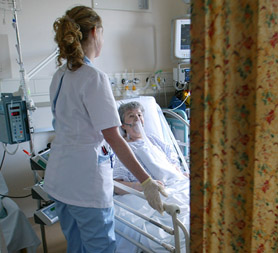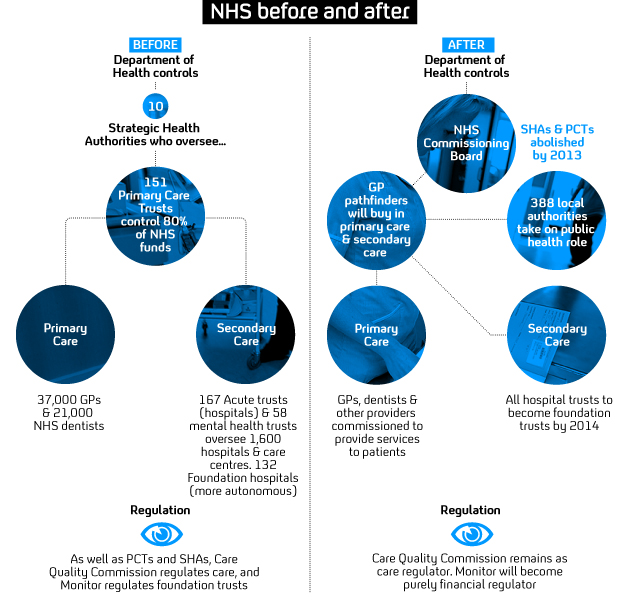NHS: ‘patient-centred’ reform means 24,500 job losses
A radical NHS shake-up, which will cause 24,500 job losses, is called “patient-centred” by Andrew Lansley but the Patients Association tells Channel 4 News it is “not convinced” as cuts start to bite.

The Health and Social Care Bill published by the Coalition proposes some of the most radical reforms in the history of the National Health Service, including handing over around 80 per cent of the £100bn NHS annual budget to GPs.
The Government said a patient-centred NHS was a “step closer to reality” as it published its plans.
Health Secretary Andrew Lansley said: “Modernising the NHS is a necessity, not an option – in order to meet rising need in the future we need to make changes.
Modernising the NHS is a necessity, not an option. Andrew Lansley MP
“We need to take steps to improve health outcomes, bringing them up to the standards of the best international healthcare systems, and to bring down the NHS money spent on drugs.
“This legislation will deliver changes that will improve outcomes for patients and save the NHS £1.7 billion every year – money that will be reinvested into services for patients.”
Patients Association: 'We are not convinced'
The ethos of the Patients Association is to put the patient at the heart of the NHS. The patient should be at the centre of all that the NHS does and should be the driving point for all health policies developed by any Government.
So does the recent Health Bill offer real change for patients and will it deliver on its promise of making the NHS truly patient-centric? We are not convinced.
Where is the evidence that GP-commissioning will work? We have yet to see any. Patients tell us that the time they spend with their GP is already too short and they do not want their GP focusing on balancing the books instead of treating them. Also, what about patient choice? Will a GP refer a patient to the cheapest services that they can buy or the best service? This policy is a real concern for patients as it appears to conflict with providing them the best treatment.
The Health Bill promises choice and information without any cuts to frontline services but the reality is this is already happening. We are already hearing on our helpline that patients are experiencing the withdrawal of a range of service and treatments including asthma medication, physiotherapy, counselling services and hernia operations.
In addition, we are also hearing this from healthcare professionals as well. Cuts are here and cuts are happening. This is only going to get worse in the current financial climate and we do not see how the advent of this new Health Bill will prevent this happening.

Channel 4 News special report - NHS: reform and cuts
The plans include the abolition of another layer of management in the NHS, Strategic Health Authorities. In place of these bodies, and Primary Care Trusts, the plan is to set up GP consortia which will commission health services for patients, overseen by a national commissioning board.
All 152 of England’s primary care trusts (PCTs) scrapped alongside 10 strategic health authorities, leading to the predicted loss of 24,500 jobs.
Responsibilities for public health and social care will transfer to local authorities.
Some doctors have criticised the plans, warning of the risks of a “worryingly ambitious” timescale for the reforms at a time when the NHS is under pressure to save £20bn.
But the Government said more than 141 GP pathfinder consortia had already been set up, showing the profession’s enthusiasm for the changes.
Labour leader Ed Miliband described them as like “tossing a hand grenade into the NHS”, echoing the comments of Tory MP Sarah Wollaston, who is a also a GP.
At Prime Minister’s Question’s Mr Miliband accusing David Cameron of being “arrogant” for pressing ahead with them despite warnings from unions and health experts.
Mr Miliband said: “Patients are worried. Doctors and nurses say your reforms are extremely risky and potentially disastrous.
“Why are you so arrogant to think you are right and all of the people who say you are wrong are wrong?”
Liberal Democrat Andrew George, a member of the Commons Health Select Committee, also asked why the prime minister was taking a “gamble” over the shake-up.
But Mr Cameron said the Government was “reforming the NHS so that we have got the best in Europe”.
He said: “We want to see waiting times and waiting lists come down. The whole aim of these NHS reforms is to make sure we get the value for the money we put in.”
Broken promises?
Responding to the publication of the bill, John Healey MP, Labour’s Shadow Health Secretary, said: “This Health Bill is three times bigger than the legislation that set up the NHS in 1948. It’s a huge upheaval which will put unnecessary extra pressure on the NHS and could open up all parts of the NHS to competition from private health companies.
“After less than a year of Conservative-led Government, the NHS is already showing signs of strain. Patients who now see their operations cancelled or services cutback will be the victims of this reckless NHS reorganisation. This is exactly what the Tory-led Government pledged not to do in their Coalition Agreement, and is a big broken promise on the NHS by the Prime Minister.”
'Biggest changes in health service history'
The cost of implementing the changes is £1.4 billion but the health secretary says that it will save the NHS more than £5bn by 2014/15 and £1.7bn every year thereafter.
The reforms themselves mean the loss of 24,500 jobs - almost 21,000 of them will be through redundancy.
So far, 141 consortia have signed up to be "pathfinder" groups, covering more than half of England's population. Mr Lansley says they will test out his plans although in reality it is unlikely that he will row back should it be found there are problems.
It took some time for voices of dissent to be heard over the reform plans, partly because of their complexity and partly because most people in the health sector do believe that some change is necessary.
The primary concern remains about the speed and scale of the reforms. The Health Select Committee, chaired by former health secretary, Stephen Dorrell, said that it had been surprised by the change of approach between the Coalition programme and the white paper.
Read more from Social Affairs Correspondent Victoria Macdonald
-
Latest news
-
Laughing Boy: New play tells the tragic tale of Connor Sparrowhawk5m

-
Sewage warning system allows some of worst test results to be left off rating system, analysis shows3m

-
Post Office inquiry: Former CEO didn’t like word “bugs” to refer to faulty IT system4m

-
Israeli soldier speaks out on war in Gaza12m

-
PM’s defence spending boost should be ‘celebrated’, says former Armed Forces Minister4m

-




